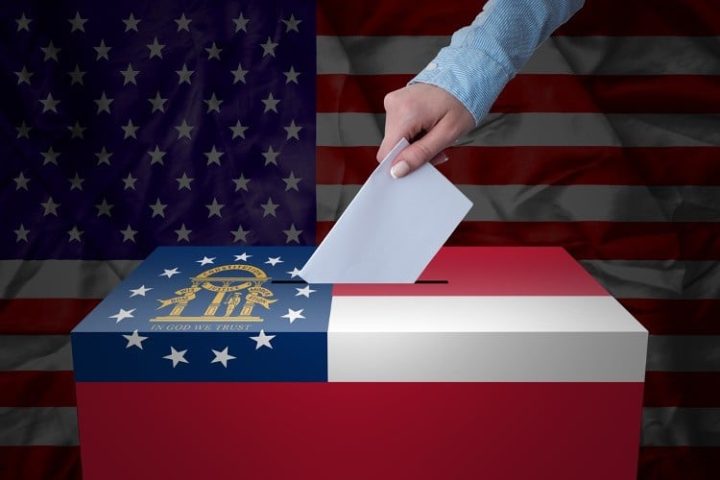
Democrats are attacking it. Republicans are praising it. But does Georgia’s newly-enacted “Election Integrity Act of 2021” actually do what its title claims?
According to a preliminary examination of the bill by The New American, while the bill does contain at least two provisions that improve election integrity, it also contains multiple anti-integrity provisions that, as a whole, make the measure a step backward.
Background
Following widespread documentation of voter fraud in the U.S. presidential and Senate elections in Georgia, the General Assembly went to work crafting — belatedly — legislation to restore election integrity in the state and prevent fraud.
On March 25, Governor Brian Kemp signed the legislature’s final product, Senate Bill 202 (S.B. 202), titled the “Election Integrity Act of 2021.”
Immediately upon its enactment, Democrats predictably attacked the bill as racist. President Joe Biden, for example, labeled it “un-American” and “Jim Crow in the 21st Century.” Meanwhile, left-wing groups immediately moved to challenge the new law in court.
On the other hand, some Republicans and conservatives praised S.B. 202. Heritage Action, the advocacy arm of the Heritage Foundation think tank, described the law as “a model for the rest of the country.”
Bill Provisions
An examination of S.B. 202 shows that while including certain pro-integrity reforms, much of the bill actually amounts to a step backward when compared to The John Birch Society’s list of pro-integrity voting solutions.
Among S.B. 202’s positive reforms is its voter ID requirement to receive an absentee ballot (pages 38-39). This includes an applicant providing “his or her name, date of birth, address as registered, address where the elector wishes the ballot to be mailed, and the number of his or her Georgia driver’s license or identification card.” While this is an improvement from Georgia’s previous law, the General Assembly abandoned a measure to end no-excuse absentee voting.
Another pro-integrity reform is S.B. 202’s establishment of a telephone hotline for citizens to report potential voter fraud and intimidation (pages 7-8). Under this provision, Georgia’s attorney general would be authorized to review each claim and determine whether to pursue an investigation or prosecution.
While a positive step, this provision should go one step further and make the hotline calls public information immediately and have a provision for a formal request to have an official public report on any complaint filed.
However, S.B. 202 contains a number of negative provisions that will undermine the integrity of Georgia elections.
For example, the bill will require at least two Saturdays and two optional Sundays of early voting (page 4). This provision expands the number of early weekend voting days, moving Georgia away from JBS’s recommendation that early voting be entirely abolished. Worse, Georgia legislators had originally proposed limiting the number of early-voting weekend days before capitulating.
Another provision in S.B. 202 would limit the use of ballot drop boxes, only allowing them to be placed at early voting locations when those locations are open. However, this is a step backward. As the bill admits (page 5), drop boxes began being used in Georgia — through a unilateral decree by the State Election Board — only after the coronavirus pandemic began. Thus, this provision amounts to a legislative legalization of a formerly illegal practice.
Worse, S.B. 202 restricts the ability of citizens and other observers to monitor vote-counting (page 67). Specifically, the bill prohibits observers from “Using or bringing into the room any photographic or other electronic monitoring or recording devices, cellular telephones, or computers.” This provision would strip observers of an effective means of providing evidence of fraud, if and when it occurs, and it contradicts JBS’s recommendation of increasing vote-counting transparency.
Furthermore, S.B. 202 adds a provision mandating that poll watchers complete “training provided by the political party, political body, or candidate designating the poll watcher” (page 73). Once again, this provision would limit who can observe vote-counting when criteria actually should be expanded. Furthermore, it would create an establishment monopoly over election observers and prohibit independently trained individuals from participating.
Furthermore, S.B. 202 does not change an existing provision (page 68-69) that severely limits the ability of observers to communicate with those outside the vote-counting centers. The lack of provisions promoting vote-counting transparency — and the existence of new provisions that decrease transparency — are some of the most anti-integrity portions of the law.
Lastly, S.B. 202 enacts ranked-choice voting for military and overseas voters, something the bill claims will make it possible to shorten the length of time between the general election and the runoffs (pages 5-6). While a relatively minor provision, this amounts to a sneaky way of introducing ranked-choice voting, a practice that distorts election results and is used by the Left in other states to win elections.
Conclusion
While S.B. 202 includes certain pro-integrity provisions, it also contains a disappointingly large number of measures that harm transparency and decrease the ability to combat voter fraud.
Despite the Left’s angry response to this law’s very existence, legislators should have gone further to protect against election fraud, and in its current state, pro-integrity reformers cannot consider S.B. 202 a victory.




